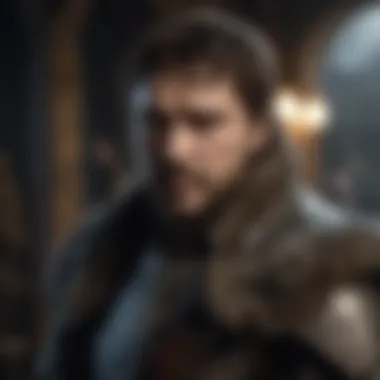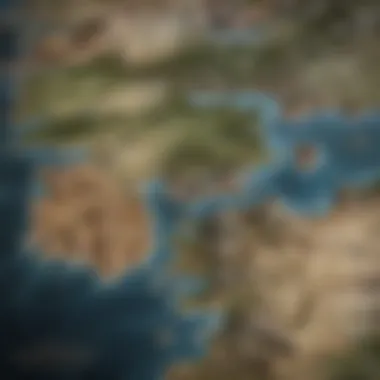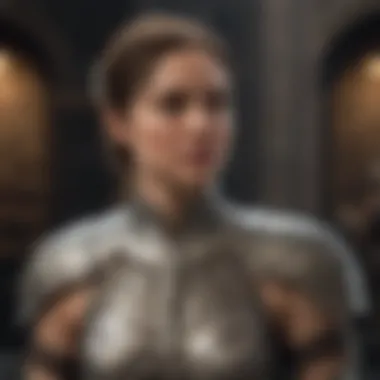Exploring the Future of Game of Thrones: Spin-offs & Beyond


Intro
The saga of Game of Thrones did not end with its final season; rather, it transformed into something much larger. The conclusion of the primary narrative left a spectrum of reactions from audiences worldwide, transforming fan engagement and expectations. This article aims to explore the future landscape of Westeros, diving into the possibilities of new content, spin-offs, and the evolving relationship between creators and fans.
Character Dissections
In examining the trajectory of Game of Thrones, one must consider its fundamental characters, whose lives have shaped the world of Westeros.
Detailed Analysis of Key Characters
Game of Thrones introduced audiences to complex characters like Jon Snow, Daenerys Targaryen, and Tyrion Lannister. Each character embodies unique motivations and moral dilemmas that resonated with viewers.
- Jon Snow: Representing honor, loyalty, and sacrifice, Jon's journey from the Night's Watch to the Iron Throne showcases themes of identity and leadership.
- Daenerys Targaryen: Once a naive girl, she transforms into a powerful leader, embodying ambition and the pursuit of justice, albeit through increasingly controversial means.
- Tyrion Lannister: The witty and insightful dwarf uses his intellect to navigate the treacherous politics of Westeros, highlighting themes of cleverness in a world often dominated by brute force.
Character Development Throughout the Series
The development of these characters is central to the narrative's richness. Each character evolves based on their experiences, choices, and the political landscape around them. Jon's rise and subsequent fall raise questions about the nature of true leadership. Daenerys's transformation reflects the thin line between ruler and tyrant. Tyrion's intelligence in contrast to his family's brutality speaks to resilience in a hostile environment.
Impact on the Overarching Storyline
The fates of these characters tie deeply into the broader narrative arcs of Game of Thrones. Their journeys culminate in climactic moments that affect the entire realm of Westeros. Every decision influences alliances, conflicts, and ultimately, the power dynamics of the kingdom. As new narratives surface, the analysis of these characters will guide both creators and fans in understanding the complexities of the emerging storylines.
Episode Breakdowns
This section focuses on significant episodes that mark critical turning points in the story.
- The Red Wedding: An unforeseen betrayal that exemplifies the brutality of political maneuvering in Westeros.
- The Night King's Fall: A pivotal moment that shifts the story away from a singular focus on the Iron Throne to the broader existential threats faced by humanity.
Exploration of Themes and Symbolism
Common themes such as betrayal, loyalty, and the quest for power are prominent throughout the episodes. Symbolism, including the use of direwolves and dragons, highlights the characters' connections to their heritage and fate.
Key Moments and Their Implications
Each episode holds moments that have lasting implications for the narrative. Key scenes often disrupt expectations, steering characters and viewers alike into uncharted territories.
Lore Explorations
The lore of Westeros provides a rich tapestry that lays the foundation for the series.
Delving into the Rich History and Lore of Westeros
From the ancient Targaryen dynasty to the rise of the Stark family, the history of Westeros is complex and intricate, filled with battles, alliances, and betrayals. Understanding this context enhances the appreciation of character motivations and narrative choices.
Uncovering Hidden Details and Connections
Reviewing the series reveals many hidden details that bind characters and events. For instance, the significance of House sigils often parallels the fates of respective families.
Exploring the Cultural and Mythical Aspects of the World
Game of Thrones draws heavily from various cultural and mythical influences. The interplay of magic, religion, and folklore underpins the series' thematic depth.
Fan Theories
The Game of Thrones fandom is rich with theories and speculations.


Compilation of Popular and Intriguing Fan Theories
Fans have proposed various theories regarding character fates and future narratives. For instance, theories about Jon Snow's true parentage continue to provoke discussion.
Evaluation of Theories Based on Evidence from the Show
Critically examining these theories using evidence from the narrative can lead to fascinating insights. Some theories align closely with established lore and character arcs, while others push creative boundaries.
Speculation on Future Plot Developments
As new content arrives, fans speculate how existing plots will intertwine with fresh stories. The potential for further exploration of characters' backstories offers a plethora of creative avenues.
Current Status of Game of Thrones
The status of Game of Thrones remains a significant topic for discussion among its extensive fan base. This section explores the critical implications of the series' conclusion, the responses from both critics and audiences, and its influence on popular culture and the fantasy genre. Insight into these facets provides a well-rounded picture of how the series is currently perceived and its ongoing cultural relevance, which sets the stage for understanding future developments in the franchise.
Final Season Overview
The final season of Game of Thrones, which aired in 2019, was met with polarizing views. Many dedicated viewers had eagerly anticipated the conclusion of the narrative arcs developed over nearly a decade. The season consisted of six episodes, aiming to tie up complex storylines and character fates. While it delivered high production values and spectacular visuals, some fans criticized the pacing and character decisions, feeling that the storytelling became too rushed.
Notably, significant plot resolutions, such as Daenerys Targaryen’s ultimate fate and Bran Stark's ascension to the throne, sparked intense debate. Several fans expressed their dissatisfaction through online platforms, where they shared alternative endings and critiques of writing choices. This collective response highlights the passionate engagement that fans have with the series, demonstrating that even a conclusion can prompt ongoing discussion among enthusiasts.
Critical Reception and Audience Response
The critical reception of the final season was notably mixed. Reviewers were divided, with some praising the production quality and others highlighting perceived weaknesses in plot development. On sites like Rotten Tomatoes and Metacritic, audience scores took a sharp decline compared to previous seasons. Critics noted that the intricate storytelling, which had defined earlier episodes, felt diminished in its final stretch.
"Every story must end, but Game of Thrones leaves a legacy of questions and theories that will linger long after the curtain falls."
The audience's disappointment was palpable, with many turning to social media platforms like Reddit and Facebook to voice their opinions. This backlash points to a disconnect between creator intentions and viewer expectations. In time, it became clear that the ending has been influential in shaping conversations about narrative closure and satisfying character arcs in television.
Merchandising and Cultural Impact
Despite mixed reviews of the final season, the merchandising surrounding Game of Thrones continues to thrive. Items such as collectibles, apparel, and themed games have maintained immense popularity. Companies like HBO have capitalized on the show’s legacy, creating a wide array of products that resonate with existing fans and collectors. The show's cultural impact extends beyond merchandise, as elements of Game of Thrones have seeped into various aspects of pop culture, inspiring references in other television shows and movies.
Moreover, conventions and fan events regularly celebrate the series, drawing thousands of attendees. This ongoing cultural relevance reflects how Game of Thrones has transcended a mere TV show to become a significant cultural phenomenon. As we look toward the future, the legacy of this franchise will certainly shape upcoming content and fan engagement.
Spin-Offs and Future Projects
The exploration of spin-offs and future projects is crucial in understanding the direction of the Game of Thrones franchise. Following the series' ending, fans have speculated about what stories could emerge from the rich lore of Westeros. Spin-offs offer a way to continue engaging with this vast world, providing new narratives that can either build upon existing ones or venture into unexplored territories. They represent both a creative opportunity for storytellers and a way to satisfy audiences hungry for more content.
Overview of Announced Spin-Offs
Several spin-off projects have been announced, promising varied themes and settings within the Game of Thrones universe. The most notable include:
- House of the Dragon: Centered on House Targaryen, this series is set 200 years before the original show. It aims to depict the events leading up to and during the Targaryen civil war known as the Dance of the Dragons.
- The Tales of Dunk and Egg: A series based on the novellas by George R.R. Martin that follows the adventures of Ser Duncan the Tall and his squire, Egg, who later becomes Aegon V Targaryen.
- The Jon Snow Spin-Off: Reports suggest a potential follow-up series centered on Jon Snow after the conclusion of the original series, allowing fans to explore his future and unresolved storylines.
This variety in announced projects demonstrates the developers' ambition to expand the narrative universe and cater to diverse audience interests.
Development Status
As of now, some projects are in various stages of development. House of the Dragon, for instance, is well into production, with significant progress already visible. This series recently released its first season, which garnered both viewership and critical attention.
On the other hand, the other projects, such as the tales of Dunk and Egg, are still in early discussions. The feasibility and viewer interest in these spin-offs are likely key considerations for the creators. The ongoing assessment of audience expectations will heavily influence the acceleration of these projects.
Potential Story Arcs and Characters


The potential spin-offs allow for a range of story arcs and character developments:
- House of the Dragon may explore power struggles within House Targaryen, themes of loyalty and betrayal, and the consequences of playing with fire, both literally and metaphorically.
- The Tales of Dunk and Egg offers a more whimsical perspective on the Game of Thrones universe, focusing on camaraderie, adventure, and even societal issues through the lens of these beloved characters.
- With the Jon Snow storyline, possibilities abound. His return could address unresolved personal conflicts and relationships, weaving new paths for the character.
The expansion into these territories not only allows for deeper character explorations but also enables fans to reconnect with beloved aspects of the lore. Each project holds promise, and their unique angles could enrich the overall narrative tapestry of Westeros.
Fan Theories and Speculation
Fan theories and speculation play a critical role in keeping the conversation around Game of Thrones alive. These theories not only reflect the creativity of the fanbase but also influence what fans hope to see in future content. In a series known for its intricate plot twists and character arcs, the ideas proposed by fans offer insights into expectations and desires for narrative continuity.
These discussions can serve multiple purposes. They help to maintain engagement within the community, provide a platform for fans to explore potential outcomes, and keep the series relevant even after its conclusion. Additionally, they can provide feedback to creators about what elements resonated with fans and what they might want to see in spin-offs or continuations of the story.
Popular Theories on Series Continuation
Fans have generated numerous theories about the future of Game of Thrones. Some of the most popular include:
- Dany's Fate: A considerable number of fans speculate whether Daenerys Targaryen might return in some form. Theories suggest she could come back through flashbacks, or possibly via a different time period in the storyline.
- The Return of Bran: Some fans discuss Bran Stark's possible role as a future leader of Westeros, asserting that his powers may have further implications for the continent, and how that may unfold.
- Azor Ahai: The theory surrounding Azor Ahai continues to captivate fans. Many believe that Jon Snow or Daenerys may fulfill this prophecy, foreshadowing significant events in future projects.
These theories highlight the depth of the story’s lore and how it continues to encourage active participation in the narrative.
Character Revival Discussed by Fans
There is an ongoing dialogue regarding character revivals, and fans are particularly interested in a few key figures. The notion of bringing characters back into the narrative raises questions about what constitutes "death" in the Game of Thrones universe. Some characters whose possible return is hotly debated include:
- Cersei Lannister: Despite her fate, theories suggest her legacy may live on in other characters, or flashbacks could bring her story back into focus.
- Ned Stark: Fans have proposed scenarios involving Bran's ability to alter past events, which could lead to Ned being resurrected or featured in an alternate timeline.
- Ygritte: As a fan-favorite character, discussions around her potential return focus on how her influence affected Jon Snow, and what that relationship could bring to the narrative.
Overall, the speculation surrounding character revivals fuels excitement and engagement among the fandom. Whether or not any of these theories are justified remains to be seen, but they undeniably play a significant role in shaping the expectations of fans as they anticipate the future of the franchise.
Creators' Insights
Understanding the insights of the creators behind Game of Thrones is crucial for grasping the future direction of the franchise. These insights not only illuminate the vision that drove the original narrative but also might hint at potential evolutions in the story and character arcs. By analyzing the perspectives of those directly involved in the production, fans can better appreciate the complexities behind character development and plot twists. Additionally, these insights can illuminate the intentions and challenges filmmakers face when continuing a beloved series. In a time where audience expectations are high, creators' statements can serve as a guide to future narratives and thematic explorations.
Interviews with Cast and Crew
Interviews with the cast and crew of Game of Thrones provide a wealth of information about behind-the-scenes dynamics and personal experiences. Actors often share their emotional connections to their characters, revealing how these roles evolved over the years. For example, actors like Emilia Clarke (Daenerys Targaryen) and Kit Harington (Jon Snow) have spoken about the intense preparation and deep investment they made in their roles.
Moreover, insights from the crew regarding production challenges highlight the intricate processes required to bring the expansive world of Westeros to life. These firsthand accounts can also span topics such as location scouting, set design, and special effects, which are all fundamental to creating an engaging viewing experience. Understanding these aspects enriches the appreciation of the series, demonstrating how far-reaching the impact of teamwork is in storytelling.
Statements from Showrunners
Statements from showrunners like David Benioff and D.B. Weiss carry significant weight in shaping audience expectations. Their reflections touch on thematic elements they prioritized and how they envisioned the conclusion of the series. In various interviews, the duo emphasized the importance of character arcs and moral complexity throughout the series.
For instance, their thoughts on the ending reactions can clarify decisions made during production. Did they anticipate the divided reaction to key moments? Such ponderings add depth to the narrative, as they reveal how creators balance artistic vision against audience reception.
"Our goal was always to make the story feel real and impactful, even in a fantasy context."
Furthermore, understanding showrunners’ insights offers a projection into future projects. Their ideas and philosophies could heavily influence upcoming spin-offs or sequels. As fans ponder new series, the intentions expressed by these creators will help frame the direction of any forthcoming narratives, enriching the lore surrounding the Game of Thrones universe.
The Broader Fantasy Landscape
The future of Game of Thrones cannot be understood in isolation. To appreciate its potential directions, it is essential to explore the broader fantasy landscape. This includes examining the trends emerging within television and streaming services that influence viewer expectations. Additionally, it is crucial to think about how Game of Thrones fits within a larger category of fantasy series that have captured audience interests in various ways.
Trends in Television and Streaming
Television viewing habits have transformed significantly in recent years, largely driven by the rise of streaming platforms. Audiences now expect quick access to content and often favor binge-watching entire seasons. This trend directly impacts how new content might be produced and released in the Game of Thrones universe.


- Serialized storytelling has become more sophisticated, with many shows offering in-depth narratives that keep viewers engaged. This approach aligns well with how Game of Thrones structured its plotlines, and future projects can take advantage of this.
- Diversity of content is gaining importance, as viewers demand representation and complex characters. This shift opens opportunities for new narratives that include a range of cultures and perspectives within Westeros.
- Shorter seasons with higher production values are becoming favorable. Shows like The Witcher and The Mandalorian illustrate how a focus on quality can lead to success.
The impact of these trends suggests that upcoming Game of Thrones projects could deliver content that aligns with modern expectations, potentially leading to renewed interest in the franchise.
Comparative Analysis with Other Fantasy Series
To fully understand the Game of Thrones phenomenon, it is valuable to contrast it with other successful fantasy series. Different shows have adopted various approaches to storytelling, character development, and world-building.
For instance, here are key elements to consider:
- Character Complexity: Series like His Dark Materials focus on character arcs that are often more straightforward but still engaging, contrasting with the moral ambiguity that defines many Game of Thrones characters.
- World-Building: Shows like Shadow and Bone have expanded their lore thoroughly, creating immersive worlds. Future Game of Thrones projects can take notes from this to enrich its storytelling, thereby appealing to die-hard fans.
- Cultural Representation: Recent series such as The Wheel of Time have embraced a more diverse representation of characters, ensuring a wider audience feel included.
"The landscape of fantasy television is ever-evolving. Each show brings something unique, and Game of Thrones must adapt to remain relevant." This quote encapsulates the necessity for adaptive storytelling in light of broader industry changes.
In understanding these dynamics, it is clear that while Game of Thrones has set a high precedent, the evolving landscape presents both challenges and opportunities. The interplay between new content and audience expectations will significantly shape its future narrative paths.
Implications for the Franchise
The implications for the franchise "Game of Thrones" extend beyond mere headlines. As the series concluded its run, the conversation surrounding its future has intensified. The narrative will not just rest in the past; rather, it will evolve with fan engagement and market trends. Understanding these implications is crucial for both its creators and its devoted audience.
Audience Expectations
Audience expectations now hold significant weight in shaping the future direction of the franchise. Fans invested years in the intricate stories, character developments, and unpredictable plotlines. They desire a return that not only satisfies but also honors the original material's spirit. Several factors contribute to these expectations:
- Continuation of Characters: Many viewers hope for the revival of beloved characters. Names like Jon Snow and Daenerys Targaryen frequently surface in discussions. There’s a longing for closure or deeper explorations into their arcs.
- Quality of Storytelling: After the final season, many fans voiced dissatisfaction with narrative choices. A clear expectation exists for future projects to prioritize coherent and engaging storytelling.
- Expanded Universe: The audience is eager to see how the rich lore of Westeros can be expanded. Spin-offs and prequels can delve into various timelines and regions, enriching the universe further.
As the franchise moves forward, addressing these expectations will be vital in recapturing the magic that once made the series iconic.
Economic Factors Influencing Production
Economic factors play a fundamental role in determining the future of "Game of Thrones". The production of high-quality content requires substantial investment. Numerous elements can affect this economic landscape:
- Investor Confidence: The franchise's past success can attract investors. However, the mixed reception of the last season has created hesitancy. Future projects must demonstrate potential for profitability to secure funding.
- Market Demand: As streaming platforms expand, competition increases. "Game of Thrones" needs to align with current trends in viewership and technology. This could mean adapting storytelling techniques or embracing innovations in production.
- Merchandising Opportunities: The franchise has previously generated revenue through merchandise. Future projects can exploit this by introducing new characters and stories appealing to both seasoned fans and newcomers. This could enhance financial sustainability over time.
Overall, a blend of audience expectations and economic considerations will influence the trajectory of the "Game of Thrones" franchise. Decisions will need thorough analysis to maximize potential, ensuring this beloved universe continues to thrive.
Concluding Thoughts
The ending of Game of Thrones has sparked extensive discussions about its legacy and potential future. Throughout this article, we explored various aspects that define the series' impact. The concluding thoughts aim to synthesize key elements and highlight the considerations for fans and creators alike.
The Legacy of Game of Thrones
Game of Thrones, based on George R.R. Martin's literary works, has left an indelible mark on television and popular culture. Its complex characters, intricate plots, and political intrigue captured the attention of millions of viewers worldwide. The show not only redefined fantasy storytelling for a new generation but also brought an unprecedented level of realism and gravitas to the genre.
The legacy transcends beyond just viewership numbers. The cultural phenomena surrounding the series include discussions on morality, power dynamics, and human nature. Many fans have invested countless hours into analyzing character arcs, nuanced storytelling, and thematic elements that are present throughout the series.
Moreover, Game of Thrones has influenced countless other shows and films that followed its success. It has set a high standard for production values in television, especially in the fantasy genre. The intricate world-building and narrative complexity created a template that many aspire to replicate.
Future Directions for the Series
As we look toward the future of the Game of Thrones franchise, several potential directions emerge. The announced spin-offs and prequels open the door for new stories and characters that can expand on the richness of Westeros. Fans are eager to see how these projects will enhance or reinterpret the existing lore.
Important aspects to consider include:
- Character Development: Future narratives might focus on lesser-known characters or events that were briefly mentioned in the original series.
- Thematic Continuity: Maintaining the thematic elements that defined the original series will be crucial. Themes of power, betrayal, and survival resonate deeply with audiences.
- Fan Engagement: As fan theories continue to evolve, the creators may find themselves responding to audience desires and expectations actively.
In closing, the legacy of Game of Thrones and its evolving future both play a significant role in maintaining the franchise's relevance. Fans remain deeply invested, and the potential for new content keeps the conversation alive. Maintaining the essence of what made the series successful will be paramount as the franchise moves forward.
"The world of Westeros continues to captivate the imagination, reminding us that stories are never truly over, and that every ending can lead to a new beginning."
The path ahead is filled with opportunities for creativity and narrative exploration. This journey will undoubtedly shape the future of Game of Thrones for years to come.



